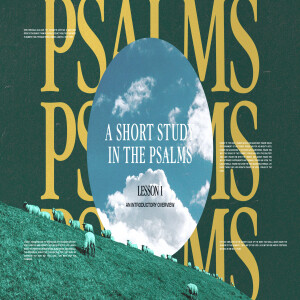
John Sullivan (FBC Trustee + Deacon) - Genesis 9:1-7; 12:1-3; 15; 17; Exodus 19-24; 2 Samuel 7; Psalm 1;6; 3:7-8; 8:1 & 9; 19:7; 24:1; 40:3; 42:1; 74:13-14; 89; 119; Jeremiah 31:31-34; Luke 22:20; Hebrews 8
This lesson explores the overall structure and intentional design of the Book of Psalms, helping us see how this ancient collection functions as more than just a random anthology of songs and prayers. We’ll discover how the Psalms are organized, how themes like worship, lament, kingship, and trust unfold across the collection, and how literary elements—such as parallelism, imagery, and poetic devices—enrich their message.
By looking at the Psalms as a unified whole, we’ll gain a deeper appreciation for how they guide God’s people in honest prayer, faithful worship, and hopeful anticipation of the Messiah.
Series description:
“A Short Study on the Psalms” is a 4-week journey through one of the Bible’s most beloved and honest books. In Week 1, we explore the overall structure and design of the Psalms, helping us see how this ancient collection works as a unified whole. Then, over the next three weeks, we zoom in on selected Psalms that speak to real-life emotions—lament, trust, and worship—revealing how these songs give voice to our hearts and lead us toward deeper faith. Whether you’re new to the Psalms or reading them with fresh eyes, this series will help you experience them as both timeless poetry and practical prayer.
Lesson 1 - An Introductory Overview
II. The Story of the Psalms in its structure
A. Book 1 (Psalms 1-41)
B. Book 2 (Psalms 42-72)
C. Book 3 (Psalms 73-89)
D. Book 4 (Psalms 90-106)
E. Book 5 (Psalms 107-150)
III. A list of the covenants
IV. What can the Psalms teach us:
A. power of language
B. the range of human emotion
C. stories of redemption
Poetic Techniques in the Psalms
No comments yet. Be the first to say something!